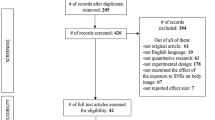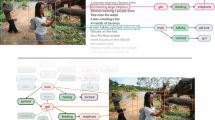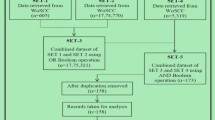Abstract—
Psychometric analysis of information from the Internet is one of the fastest growing trends in modern research. Using social networks, one can identify psychological characteristics and mental disorders. In this paper, we solve the problem of identifying personal traits, that is, predictors of depression among users of the VKontakte social network by analyzing the images they publish. We describe our methods and approaches for solving this problem and present the results of experimental verification on Vkontakte data. Our study shows that one can use object detection methods to create effective features for predicting personality traits.
Similar content being viewed by others
REFERENCES
Widiger, T.A. and Costa, Jr., P.T., Personality and personality disorders, J. Abnorm. Psychol., 1994, vol. 103, no. 1, p. 78.
Widiger, T.A. and Mullins-Sweatt, S.N., Clinical utility of a dimensional model of personality disorder, Prof. Psychol.: Res. Pract., 2010, vol. 41, no. 6, p. 488.
Stankevich, M., Latyshev, A., Kiselnikova, N., and Smirnov, I., Predicting personality traits from social network profiles, in Artificial Intelligence. RCAI 2019. Communications in Computer and Information Science, Kuznetsov, S. and Panov, A., Eds., Cham: Springer, 2019, vol. 1093, pp. 177–188.
Schwartz, H.A., et al., Personality, gender, and age in the language of social media: The open-vocabulary approach, PLoS One, 2013, vol. 8, no. 9, p. E73791.
Kosinski, M., Stillwell, D., and Graepel, T., Private traits and attributes are predictable from digital records of human behavior, Proc. Natl. Acad. Sci., 2013, vol. 110, no. 15, pp. 5802–5805.
Ferwerda, B., Tkalcic, M., and Schedl, M., Personality traits and music genres: What do people prefer to listen to?, Proceedings of the 25th Conference on User Modeling, Adaptation and Personalization, 2017, pp. 285–288.
Shatte, A.B.R., Hutchinson, D.M., and Teague, S.J., Machine learning in mental health: A scoping review of methods and applications, Psychol. Med., 2019, vol. 49, no. 9, pp. 1426–1448.
Kursuncu, U., et al., Predictive analysis on Twitter: Techniques and applications, in Emerging Research Challenges and Opportunities in Computational Social Network Analysis and Mining, Cham: Springer, 2019, pp. 67–104.
Losada, D.E., Crestani, F., and Parapar, J., Overview of eRisk: Early risk prediction on the Internet, International Conference of the Cross-Language Evaluation Forum for European Languages, Cham: Springer, 2018, pp. 343–361.
Yazdavar, A.H., et al., Semi-supervised approach to monitoring clinical depressive symptoms in social media, Proceedings of the 2017 IEEE/ACM International Conference on Advances in Social Networks Analysis and Mining 2017, 2017, pp. 1191–1198.
Wongkoblap, A., Vadillo, M.A., and Curcin, V., Researching mental health disorders in the era of social media: Systematic review, J. Med. Internet Res., 2017, vol. 19, no. 6, p. e228.
Reece, A.G. and Danforth, C.M., Instagram photos reveal predictive markers of depression, EPJ Data Sci., 2017, vol. 6, no. 1, p. 15.
Nolan, R.F., Dai, Y., and Stanley, P.D., An investigation of the relationship between color choice and depression measured by the Beck Depression Inventory, Percept. Motor Skills, 1995, vol. 81, no. 3, pp. 1195–1200.
Valdez, P. and Mehrabian, A., Effects of color on emotions, J. Exp. Psychol.: Gen., 1994, vol. 123, no. 4, p. 394.
Wieloch, M., et al., Profiling user colour preferences with BFI-44 personality traits, International Conference on Business Information Systems, Cham, 2018, pp. 63–76.
Ferwerda, B. and Tkalcic, M., You are what you post: What the content of Instagram pictures tells about users’ personality, The 23rd International on Intelligent User Interfaces, Tokyo, 2018.
Segalin, C., et al., The pictures we like are our image: Continuous mapping of favorite pictures into self-assessed and attributed personality traits, IEEE Trans. Affective Comput., 2016, vol. 8, no. 2, pp. 268–285.
Segalin, C., Cheng, D.S., and Cristani, M., Social profiling through image understanding: Personality inference using convolutional neural networks, Comput. Vision Image Understanding, 2017, vol. 156, pp. 34–50.
Costa, P.T. and McCrae, R.R., Normal personality assessment in clinical practice: The NEO personality inventory, Psychol. Assess., 1992, vol. 4, no. 1, p. 5.
Lin, T.Y., et al., Microsoft COCO: Common objects in context, European Conference on Computer Vision, Cham: Springer, 2014, pp. 740–755.
Ren, S., et al., Faster r-cnn: Towards real-time object detection with region proposal networks, Adv. Neural Inf. Process. Syst., 2015, pp. 91–99.
He, K., et al., Mask r-cnn, Proceedings of the IEEE International Conference on Computer Vision, 2017, pp. 2961–2969.
Bradski, G. and Kaehler, A., Learning OpenCV: Computer Vision with the OpenCV library, O’Reilly Media, Inc., 2008.
Tkalcic, M. and Tasic, J.F., Colour spaces: Perceptual, historical and applicational background, The IEEE Region 8 EUROCON 2003. Computer as a Tool, 2003, vol. 1, pp. 304–308.
Pedregosa, F., et al., Scikit-learn: Machine learning in Python, J. Mach. Learn. Res., 2011, vol. 12, pp. 2825–2830.
Funding
This work was supported by the Ministry of Science and Higher Education of the Russian Federation, project no. 075-15-2020-799.
Author information
Authors and Affiliations
Corresponding authors
Ethics declarations
The authors declare that they have no conflicts of interest.
About this article
Cite this article
Ignatiev, N.A., Stankevich, M.A., Smirnov, I.V. et al. Predicting Personal Traits from Vkontakte Images. Sci. Tech. Inf. Proc. 47, 383–388 (2020). https://doi.org/10.3103/S0147688220060039
Received:
Published:
Issue Date:
DOI: https://doi.org/10.3103/S0147688220060039




